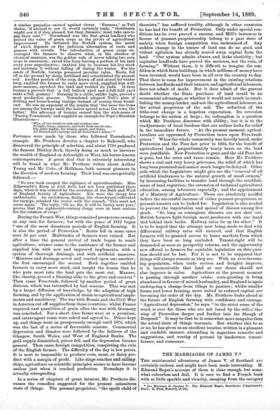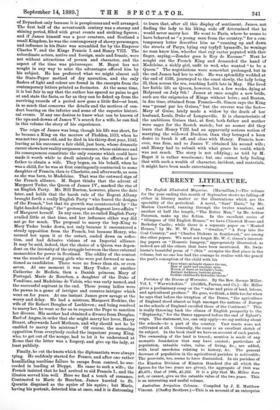THE MARRIAGES OF JAMES V.
THE matrimonial adventures of James V. of Scotland are certainly curious, and might have been made interesting. M. Edmond Bapst's account of them is clear enough, but some- what colourless and dull. It is rare to find a French book with so little sparkle and vivacity, escaping from the category • Les Mariages de Jacques V. Par Edmond Bapst, Beeretaire d'Ambassade. Paris : E. Pion, Nourrit, at OM.
of Dryasdust only because it is perspicuous and well arranged. The first half of the seventeenth century was a stormy and shining period, filled with great events and striking figures ; and if James himself was a poor creature, and Scotland a small Kingdom, he was the contemporary of showy personages, and influence in his State was scrambled for by the Emperor Charles V. and the Kings Francis I. and Henry VIII. The subordinate actors, native and foreign, male and female, were not without attractions of person and character, and the aspect of the time was picturesque. M. Bapst has not sought in any way to seize the advantages offered him by his subject. He has preferred what we might almost call the State-Paper method of dry narration, and the only flashes of light and colour are found in the excerpts from the contemporary letters printed as footnotes. At the same time, it is but fair to say that the author has spared no pains to get at and state the facts, so far as they can be fished up from the surviving records of a period now gone a little fiat—at least, in so much that concerns the details and the motives of con- duct bearing on the inferior and some of the superior histori- cal events. If any one desires to know what can be known of the ups-and-downs of James V.'s search for a wife, he can find in this volume the story of his experiences.
The reign of James was long, though his life was short, for he became a King on the morrow of Flodden, 1513, when he was not two years old, and he died in his thirty-first year, 1542, leaving as his successor a fair child, just born, whose dramatic career shows how reality surpasses romance, whose existence and its consequences constitute the only reasons which could have made it worth while to dwell minutely on. the efforts of her father to obtain a wife. They began, on bis behalf, when he was a child, for he was at first contingently contracted to some slaughter of Francis, then to Charlotte, and afterwards, as soon as she was born, to Madeleine. That was the outward sign of the French alliance. M. Bapst thinks that the advent of Margaret Tudor, the Queen of James IV., marked the rise of an English Party. Mr. Hill Burton, however, places the date later, and holds that the harsh rule of the Regent Albany brought forth a really English Party " who feared the designs of the French," but that its growth was counteracted by " the light-headed doings," the " grotesque and flagrant love-affairs " of Margaret herself. In any case, the so-called English Party availed little at that time, and her influence either way did not go for much. The proposal to marry the boy-King to Mary Tudor broke down, not only because it encountered a steady opposition from the French, but because Henry, who seemed hot upon it at the outset, cooled down on reflec- tion, and had delusive visions of an Imperial alliance. It may be said, indeed, that the choice of a Queen was depen- dent on the intensity of the struggle between the three external monarchies for power in Scotland. The oddity of the contest was the number of young girls who were put forward or men- tioned as candidates. There were no fewer than six, or even seven. At one moment it was Mary Tudor, at another Catherine de Medicis, then a Danish princess, Mary of Portugal, Marie de Bourbon, a daughter of the Duke of Venddme, and Madeleine de Valois, who was early named, and the successful aspirant in the end. These young ladies were the pawns in a game of intrigue and counter-intrigue which went on for years. At one instant James grew savage at the worry and delay. He had a mistress, Margaret Erskine, the wife of Sir Robert Douglas of Lochleven ; and being resolved to marryher, he went so far as to request the Pope to sanction her divorce. His mother had obtained a divorce from Douglas, Earl of Angus, in order that she might marry her lover, Harry Stuart, afterwards Lord Methuen, and why should not he be enabled to marry his mistress P Of course, the menacing opposition from everybody cooled the impatient young King, who, to get out of the scrape, had to let it be understood at Rome that the letter was a forgery, and give up the lady, at least publicly.
Finally, he cut the knots which the diplomatists were always tying. He suddenly started for France, and after one rather humiliating maritime failure to escape from control, he suc- ceeded in landing at Dieppe. He came to seek a wife; the French insisted that he had arrived to aid Francis I., and the illusion served him well. Here we find a touch of romance. Contracted to Marie de Bourbon, James hurried to St. Quentin disguised as the squire of his squire ; but Marie, "having his portrait, detected him at once, and it is distressing to learn that, after all this display of sentiment, James, not finding the lady to his liking, rode off determined that he would never marry her. He went to Paris, where he seems to have behaved as " a young man from the country," for a con- temporary letter describes him as "running up and down the streets of Parys, bying eny tryfyll hymselfe, he weninge no man know him, wherfor that eny carter poynted with ther finger, saying,—Zonder goes le Roy de Escosse." Next he sought out the French King and demanded the hand of Madeleine, a sickly girl, unfit to wed, who wanted " to be a Queen." The negotiations were somewhat prolonged, but in the end James had her to wife. He was splendidly wedded at the end of 1536, journeyed to the coast slowly, the lady being ill, then across the sea, reaching Leith late in May. She lived her feeble life as Queen, however, but a few weeks, dying at Holyrood on July 9th ! James at once sought a new bride, such are the exigencies of Kings without heirs ; and Beaton, in due time, obtained from Francis—St. Simon says the King was " presse par les Guises," but the reverse was the fact— Mary of Guise, lately made a widow by the death' of her husband, Louis, Duke of Longueville. It is characteristic of the ambitious Guises that, at first, both father and mother were eager for the Scotch match; but no sooner did they learn that Henry VIII. had an apparently serious notion of marrying the widowed Duchess, than they betrayed a keen desire to break it off, and close with Henry. Francis, how- ever, was firm, and so James V. obtained his second wife ; and Henry had to submit with what grace he could, which was not much. The story is not edifying ; as told by M. Bapst it is rather wearisome ; but one cannot help feeling that with such a wealth of character, incident, and materials, it might have been made entertaining.



































 Previous page
Previous page